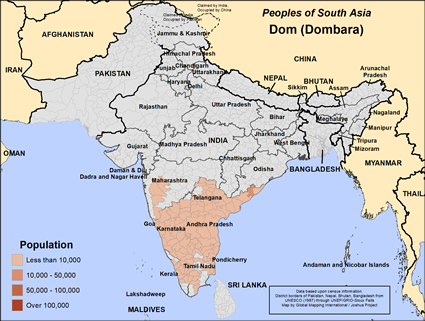Dom (Dombara) in India

Send Joshua Project a photo
of this people group. |

Map Source:
People Group data: Omid. Map geography: UNESCO / GMI. Map Design: Joshua Project
|
| People Name: | Dom (Dombara) |
| Country: | India |
| 10/40 Window: | Yes |
| Population: | 74,000 |
| World Population: | 74,000 |
| Primary Language: | Telugu |
| Primary Religion: | Hinduism |
| Christian Adherents: | 0.03 % |
| Evangelicals: | 0.00 % |
| Scripture: | Complete Bible |
| Ministry Resources: | Yes |
| Jesus Film: | Yes |
| Audio Recordings: | Yes |
| People Cluster: | South Asia Dalit - other |
| Affinity Bloc: | South Asian Peoples |
| Progress Level: |
|
Introduction / History
Dom is short for "Dombara." This is a caste of drummers, and their name refers to an energetic style of traditional music and dance. They use a variety of fast-paced rhythms for their drum music.
The Dom have low status; they are considered "untouchables," outside the caste system because of their other job: Disposing of bodies.
The Dom were written about in ancient Tantric literature. They had such low status that they had to live in separate villages. As part of a service community, they were not allowed to wear silver or gold ornaments. Doms were used as palanquin bearers, carrying those with higher status. Those with the lowest status had to dispose of both animal and human remains. That was one of their main jobs.
Though British colonialists removed some of the discriminatory practices, they classified the Doms as a criminal caste under the Criminal Tribes Acts.
Different sources give different answers about where the Dom people usually reside in today's India.
What Are Their Lives Like?
Ironically, some Dom people have made good money by selling human bones to medical schools. They have low status, whether they focus on cremating bodies or playing drums at weddings.
What Are Their Beliefs?
The Dom people practice Hinduism, the ancient religion of India. Hinduism is a catch-all phrase for the local religions of South Asia, so it is very diverse. At the popular level, Hindus worship and serve the gods of the Hindu pantheon. They visit Hindu temples and offer prayers, food, flowers, and incense to their gods in hopes of gaining protection and benefits. They do not have a personal or familial relationship with their gods like Christians or Jews. There are other Hindus who are much more philosophical, especially among the Brahmins.
Almost all Hindus participate in yearly celebrations like Holi, the festival of colors and the start of spring / Diwali, the festival of lights / Navratri, the celebration of autumn / and Rama Navami, Rama's birthday.
What Are Their Needs?
The Dom people need to put their trust and identity in the hands of the loving God of Creation who sent his son to make it possible for them to enter the Kingdom of God.
Prayer Points
Pray for a "Book of Acts" type of movement to Christ among the Dom people.
Pray God will have mercy on the Dom, doing whatever it takes to place them in a position to receive him.
Ask God to open the hearts of the Dom to the gospel.
Pray for an unstoppable movement to Christ among them.